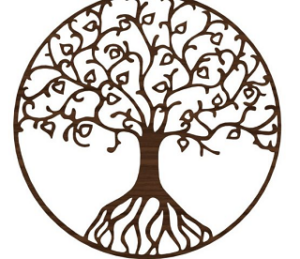
Posts Tagged ‘religião’
Moving forward to true thinking
No thought is complete if it does not have a spirituality, what modernity calls subjectivity but which is separate from objectivity as is typical of dualism, creates two realities and neither is part of the whole.
calls subjectivity but which is separate from objectivity as is typical of dualism, creates two realities and neither is part of the whole.
Contemplating the whole means considering the depth of our Being and understanding that we are part of an immense universe full of mysteries, and that our soul yearns for infinity and that is where a true spirituality walks, which is not separated from the substantiality of life (the which is called objectivity in modernity, which is just the part) and that without it we do not contemplate and live the whole, we live a segmented life.
To replace it with a small part, small vices and pleasures, is to walk in frivolity, in superficiality, no true asceticism does without a spirituality, and there is no spirituality without contemplating the human soul as part of the whole of our Being, thus surpassing anthropotechnics and to arrive at an onto-anthropotechnic that looks at things and also at the soul.
Many exercises, from the physical to the spiritual, are done seeking this asceticism, at this point Sloterdijk is right almost all of them are “despiritualized” but his explanation is incomplete because there is no eschatology in their spheres, this reasoning is done especially in Spheres II, which is the whole towards which we walk, it is possible to go to Him.
Yes, it is possible if we move towards deeper waters, seek the completeness of our substantiality, overcoming anthropocentrism and understanding the Earth and the Universe as our home, our abode, but mainly walking and casting the nets for deeper thoughts and spiritualities, there is at high sea, even if raging, what our soul longs for: the eternal.
The biblical passage Lk 5:4-5 says, right after Jesus taught the crowds and Peter (Simon) complained that they had not caught anything, Jesus answers him: “when he had finished speaking, he said to Simon: “Go into deeper waters, and cast your nets for fishing”, Simon replies that he worked all night and caught nothing, but obeyed and cast the nets.
The result was a great fishery. Here, the substantiality of the food and also the spirituality of advancing “to deeper waters” are worthy.
Verbal, mixed and mystical language
Verbal language is one in which we find only words (it can be primary, secondary or written orality), while non-verbal language involves gestures, visual signs, images, figures, drawings, photos, colors and even music, but communication can be realized beyond the gesture and then becomes a mystical communication.
primary, secondary or written orality), while non-verbal language involves gestures, visual signs, images, figures, drawings, photos, colors and even music, but communication can be realized beyond the gesture and then becomes a mystical communication.
It is not specific to religions, close people, lovers and even children can communicate with this perfection without the exclusive use of verbal or written language, it is beyond autosuggestion involves the theme that we develop further behind empathy, the vigor of a loving relationship or simply a great opening of the soul.
But the mystical language to make itself revealed to many and to be understood uses mythical resources, figures of speech, parables and even poetry, as Heidegger already thought who considered it an “other function” of language, the verses are rich in metaphors. , symbols and stories such as the passage of the Samaritan who helps a person who was robbed and attacked on the road to explain that helping the Other, mercy with those who suffer and helping is always a divine “will” for man.
However, it happens that many passages are read and analyzed out of context or out of the hermeneutic meaning of their realization, if in the past several linguistic resources were needed to read mystical documents, among them the Bible, the Quran or the book of Vedas, it does not mean that they can be read without the necessary hermeneutics.
Also updating them just to make political use, whatever the ideological tendency that makes it is a suspect hermeneutic because it depends on a certain historical conception, and we know that the sacred text, except for its contextual reading, must refer to a timeless and divine reality. aspatial (although the term does not exist), but considering the earthly life of everyone who reads it, it is on this that a good hermeneutic must be based.
The Bible does not mean anything other than what was written from a verbal word, the Christian gospels represent a review and a re-reading of the facts and verbal accounts of the early times of Christians that began with the public life of Jesus, period of domination of the Roman Empire and in which, besides him, many others claimed to be prophets.
The mystical language finds correspondence when a certain soul is in tune with the “divine will”, in the Christian saying, attentive to the Holy Spirit and having a special grace for this, which is very different from common influencers in our days due to the media powers and to the appeals to our human needs, one must be attentive to the divine, of course this is for those who believe, although also a perfect non-verbal communication can perfectly happen between those who do not believe, but it will be devoid of any divine revelation.
Ethics and religion.
Ethics and religion have always been related in history, modernity has separated them.
has separated them.
Hegel (1770-1831) despite the criticism of the Kantian model, in an attempt to build a teleological morality he created the “state morality”, which from his work ‘Principles of Philosophy of Law’ goes on to determine how the institutions that mediate it the life of the subjects referring to it as: a person in the abstract (the individual) as is typical of idealism; a moral subject and not a moral society as subjects including the moral state, and thus having an ethical citizen.
For this, Hegel describes a modern state that provides the full realization of the individual’s freedom. For him, each item of this triad (State, individual, Society) can be analyzed separately, but they are products of iterations, which are developed to arrive at the subsequent one.
In the beginning, in §4, Hegel tries to introduce free will as a starting point of law and as a motto for the development of the work, as it is in all idealistic culture about freedom:
“The domain of law is the spirit in general; there, its own base, its starting point is in free will, in such a way that freedom constitutes its substance and its destiny and that the system of law is the empire of realized freedom, the world of the spirit produced as a second nature from itself. ” (Hegel, 1997)
What he calls “realized freedom” will be done through a state conceived by an abstract right, the morality and an ethic that refer to it.
Ethicity was defined by Hegel as: “… the idea of freedom while living well, that in its consciousness it has its knowledge and its will and that, through the action of this conscience, it has its reality.” (Hegel, 1997), this is idealism is the conscience that determines reality.
As the individual has an institutionalized freedom, abstract law is the supposed freedom of free will that is determined in the face of things, classic idealistic division between subjects and objects, between objectivity and subjectivity, so to take possession, become owner, make contracts a knowing subject is created, aware of his rights, not admitting himself, but the ignorance of the current laws and thus of the conscience that each person has before objects, everything is established and guided by the state, by its ethics.
Here, there is a central aspect of our development, because it is in the State that the individual finds the possibilities of the common good to be realized, because in the particular will of each one desires the common good, it will be what makes the citizen a truly free being, that it is nothing but arbitrary interests enshrined by the State.
The moral crisis of institutions (and the state) is due to the construction of an abstract individual, of nations and not of peoples, they are not subjects, what happens is according to moral rules pre-established by interests, but whose ethics are questioned.
In a more recent time, based on studies by Husserl, after Heidegger, and recently by Paul Ricoeur and Emmanuel Lévinas, the ontological ethics is made from the Other.
Paul Ricoeur was influenced and maintained a dialogical attitude with Mounier, Marcel, and many others, maintaining a dialogical attitude with which he maintained a personal relationship.
Looking at aspects of the person (of the Other) of nature here, dialogue with religion is possible.
HEGEL, G. W. F. (1997) Princípios da Filosofia do Direito. Tradução: Orlando Vitorino. SP, Brazil: Martins Fontes. 1ª edição.
A simbologia das árvores na bíblia
A maioria das mitologias e religiões incorporam a ideia da “árvore da vida” como um elemento central de sua simbologia, a árvore como centro da vida e de onde ela irradia é um simbolismo forte e quase universal.
um elemento central de sua simbologia, a árvore como centro da vida e de onde ela irradia é um simbolismo forte e quase universal.
O símbolo adâmico, onde Adão e Eva podiam comer o fruto de todas árvores, “E ordenou o SENHOR Deus ao homem, dizendo: De toda a árvore do jardim comerás livremente,” (Gen 2:16), com exceção do fruto da árvore da vida.
Na simbologia bíblica o cedro-do-líbano, por sua altura que pode chegar a 30 metros e sua largura que pode chegar a 15 metros é símbolo de poder, majestade, grandeza e beleza, isto pode ser visto no texto de Isaías (Is 2.13), Ezequiel (Ez 17.3,22,23 – 31. a 18) e Zacarias (11.1,2).
A figueira tem uma característica que a torna um símbolo bíblico de uma vida que está seca mas pode dar fruto, está presente no antigo testamento (Provérbios 27:18), no novo testamento onde Zaqueu subiu para ver Jesus (Lc 19:4), e também dá a curiosa passagem que Jesus estava com fome indo a Betânia vê uma figueira com folhas, e apesar de não ser tempo de frutos, não encontra nada e amaldiçoa a árvore (Mc 11:12-14).
Em compensação há o pedido dos agricultores para cavar e adubar a figueira que não dava frutos (Lc 13,1-9) no contexto em que Jesus explica que nem os galileus que Pilatos matou e misturou ao sangue oferecido aos seus deuses romanos, e também os que morreram na queda da Torre de Siloé, dizendo que não morreram por serem maus e a explicação é que eles deveriam “dar frutos”.
Porém a árvore a qual Jesus se compara é a videira, em João 15:1 afirma: “eu sou a videira verdadeira, e meu Pai é o agricultor”, explica que os discípulos são os ramos e que para dar frutos sofrem a poda, para dar mais frutos ainda.
A videira não dá boa lenha nem sombra, e os ramos só podem produzir estando ligados ao tronco, dito assim: “Eu sou a videira e vós os ramos. Aquele que permanece em mim, e eu nele, esse produz muito fruto, porque sem mim nada podeis fazer” (Jo 15,5).

